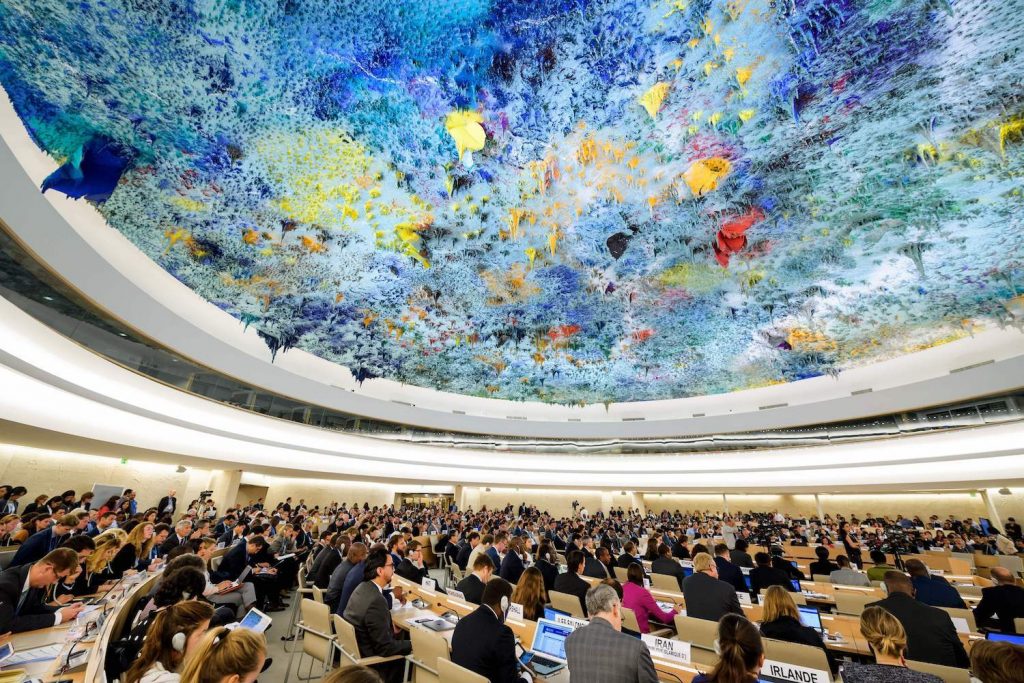Australia/Israel Review
Deconstruction Zone: Why the US was right to quit the UN “Human Rights” Council
Jun 28, 2018 | Anne Bayefsky

US President Donald Trump has rightly decided to terminate US membership on what US Ambassador to the UN Nikki Haley and US Secretary of State Mike Pompeo called the “misnamed” UN “Human Rights” Council. The move comes after the Administration gave the Council 17 months to get serious about reform and to stop spreading antisemitism under the false flag of promoting human rights.
Many believed it was 17 months that the UN didn’t deserve. US membership on the Council legitimised an especially treacherous adversary to liberal democracies: the faux human rights victim. But in response, UN actors squandered the more than generous opportunities for change provided during hundreds of meetings and are left with no one to blame but themselves.
The Human Rights Council was the UN’s cure for the now defunct Human Rights Commission – presided over by Muammar Qaddafi’s Libya shortly before somebody noticed it lacked credibility.
Other than the name change from “Commission” to “Council,” the other big difference was that when the Commission ended in 2006, its members included China, Cuba, Russia and Saudi Arabia, and when the General Assembly elected the members of the new Council, they chose China, Cuba, Russia and Saudi Arabia (No joke). Today, among the 47 states calling the shots on the UN’s top human rights body are such human rights paragons as the Democratic Republic of the Congo, Cote d’Ivoire, Qatar and Venezuela.
The Trump Administration tried hard to address the conditions for membership on the Council. While the General Assembly was first drafting the rules for the Council back in 2005, then UN Ambassador John Bolton worked tirelessly to do the same. During a five-year “review” to fix the Council back in 2011, the Obama Administration pushed for membership reform as well. They all failed, Democrat and Republican alike.
The main distinction between Republican and Democratic approaches to the Council was over the issues of whether to join it and whether to foot the bill.
US President George W. Bush said that if the Council was a tool for human rights abusers to masquerade as human rights authorities, and to foment antisemitism by using the Jewish state as its proverbial scapegoat, the leader of the free world would not join or legitimise it.
President Barack Obama said it’s better to engage, just as it was better to engage and empower Iranian sponsors of terrorism, enable Bashar al-Assad “the reformer,” and “reset” relations with Russian President Vladimir Putin until he felt secure enough to invade his neighbours.
There is no doubt that the UN Human Rights Council is a productive tool for antisemites. Discrimination against the Jewish state is baked into procedures and output as well as into its composition.
The Council reserves one permanent agenda item, governing every one of its regular sessions, only for condemning Israel. All other 192 UN member states are considered together under a separate item, if they are discussed at all. The Council has adopted more resolutions condemning Israel than any other country on earth, and nothing condemning almost 90% of the world’s states. The Council has held more emergency special sessions on Israel than on any other country, including Syria – where at least 500,000 have died and up to 12 million people have been displaced.
But even beyond the disturbing fact that antisemitism thrives at the United Nations under the guise of human rights is that the “human rights” experts, the NGOs and the academic entourage surrounding this whole apparatus, have the Council’s back. For months, they have been flooding the airwaves and Haley and Pompeo’s inboxes begging the Administration to stay on the Council. In a nutshell, they make one basic point: the demonisation of Israel, even if undeserved, is peripheral to the common good.
Pompeo and Haley have courageously set them straight. Equality rights cannot be built on inequality for Jews and the Jewish state. Playing minority groups against each other is not progress, it’s discrimination. And unless and until the common good has no Jewish exemption clause, the UN “Human Rights” Council is an oxymoron that does not deserve our respect or support.
Prof. Anne Bayefsky is Director of the Touro College Institute on Human Rights and the Holocaust and President of the NGO Human Rights Voices (www.humanrightsvoices.org). Reprinted from Foxnews.com. © Human Rights Voices, reprinted by permission, all rights reserved.






